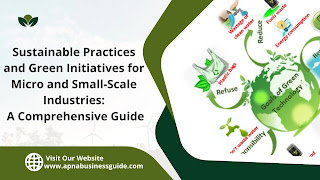Sustainable Practices and Green Initiatives for Micro and Small-Scale Industries:
A Comprehensive Guide
 |
Sustainable Practices and Green Initiatives |
Introduction
In today's world, the concept of sustainability has taken center stage. It's no longer a buzzword but a pressing need to ensure a greener, healthier, and more responsible future for our planet. While larger industries often have the resources to implement sustainability initiatives, micro and small-scale industries play a crucial role in fostering sustainability at the grassroots level. In this comprehensive guide, we will explore sustainable practices and green initiatives that are not only suitable but essential for micro and small-scale industries.
1: Understanding Micro and Small-Scale Industries
1.1. Defining Micro and Small-Scale Industries
Micro and small-scale industries (MSIs) are businesses characterized by their small size, limited workforce, and relatively low capital investment. They often operate on a local or regional scale and can be found in various sectors, including manufacturing, services, and agriculture.
1.2. The Significance of MSIs
MSIs contribute significantly to employment generation, economic growth, and poverty reduction, particularly in developing economies. Their sustainability efforts can have a widespread impact.
2: The Imperative for Sustainability in MSIs
2.1. Environmental Concerns
MSIs, like larger industries, are associated with various environmental challenges, including resource depletion, pollution, and habitat destruction. Implementing sustainable practices is essential to mitigate these issues.
2.2. Social Responsibility
MSIs often have a strong connection to their local communities. Sustainability initiatives can enhance their reputation and strengthen community ties.
2.3. Cost Savings
Sustainable practices can lead to cost savings through reduced energy consumption, waste reduction, and improved resource efficiency, which can be especially beneficial for MSIs operating on limited budgets.
YOU MAY LIKE THIS:
3: Sustainable Practices for MSIs
3.1. Energy Efficiency
Improving energy efficiency through measures like energy-efficient lighting, equipment upgrades, and better insulation can lead to significant cost savings and reduced carbon emissions.
3.2. Waste Reduction and Recycling
Implementing waste reduction and recycling programs not only minimizes environmental impact but can also generate additional revenue through the sale of recyclable materials.
3.3. Water Conservation
Water is a precious resource, and MSIs can adopt practices such as rainwater harvesting, efficient irrigation methods, and water reuse to minimize consumption.
3.4. Sustainable Sourcing
Sourcing raw materials and supplies from sustainable and local suppliers can reduce the carbon footprint and support the local economy.
3.5. Employee Training
Educating employees about sustainability practices and involving them in the process can lead to greater buy-in and more effective implementation.
3.6. Green Building Practices
MSIs can design and construct green buildings that incorporate energy-efficient features, renewable energy sources, and sustainable materials.
4: Green Initiatives for MSIs
4.1. Certification Programs
MSIs can seek certification from relevant organizations such as ISO, LEED, or Fair Trade to demonstrate their commitment to sustainability and ethical business practices.
4.2. Carbon Neutrality
Achieving carbon neutrality involves measuring and reducing greenhouse gas emissions and offsetting remaining emissions through initiatives like tree planting or renewable energy projects.
4.3. Sustainable Packaging
MSIs can explore eco-friendly packaging options, such as biodegradable materials or minimalist designs that reduce waste.
4.4. Product Innovation
Developing and marketing sustainable products or services can set MSIs apart in the market and attract environmentally conscious consumers.
4.5. Corporate Social Responsibility (CSR)
Engaging in CSR activities, such as supporting local communities or environmental conservation projects, can enhance the reputation of MSIs.
 |
| FIRSTCRY |
5: Overcoming Challenges
5.1. Financial Constraints
MSIs may face financial challenges in implementing sustainability practices. To overcome this, they can seek grants, incentives, or partnerships with sustainability-focused organizations.
5.2. Lack of Awareness
Lack of awareness and understanding about sustainability practices can hinder progress. MSIs can address this through training and education.
5.3. Resistance to Change
Resistance to change within the organization can be a barrier. Effective communication and engagement with employees are essential to overcome this challenge.
6: Case Studies
6.1. Sustainable Success Stories
Highlighting examples of MSIs that have successfully implemented sustainable practices and reaped the benefits can serve as inspiration for others.
7: Future Outlook
7.1. Emerging Trends
The world of sustainability is constantly evolving. MSIs should stay informed about emerging trends and technologies to remain competitive and environmentally responsible.
HELPFUL VIDEO:
Conclusion
Micro and small-scale industries may be small in size, but their collective impact on sustainability is substantial. By adopting sustainable practices and green initiatives, MSIs can contribute to environmental preservation, economic growth, and social responsibility. These efforts not only benefit the planet but also enhance their reputation, reduce costs, and increase competitiveness. Sustainability is no longer a choice; it's an imperative. For micro and small-scale industries, it's an opportunity to be part of a global movement towards a greener and more sustainable future, one responsible choice at a time.
IMAGE SOURCE:https://www.google.com
 |
Micro-sustainability |



.webp)











